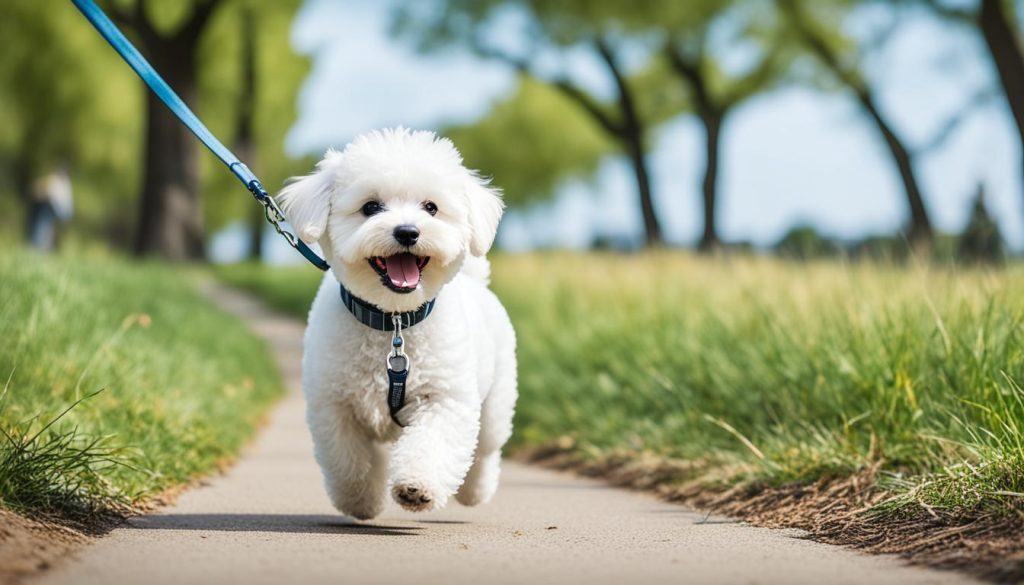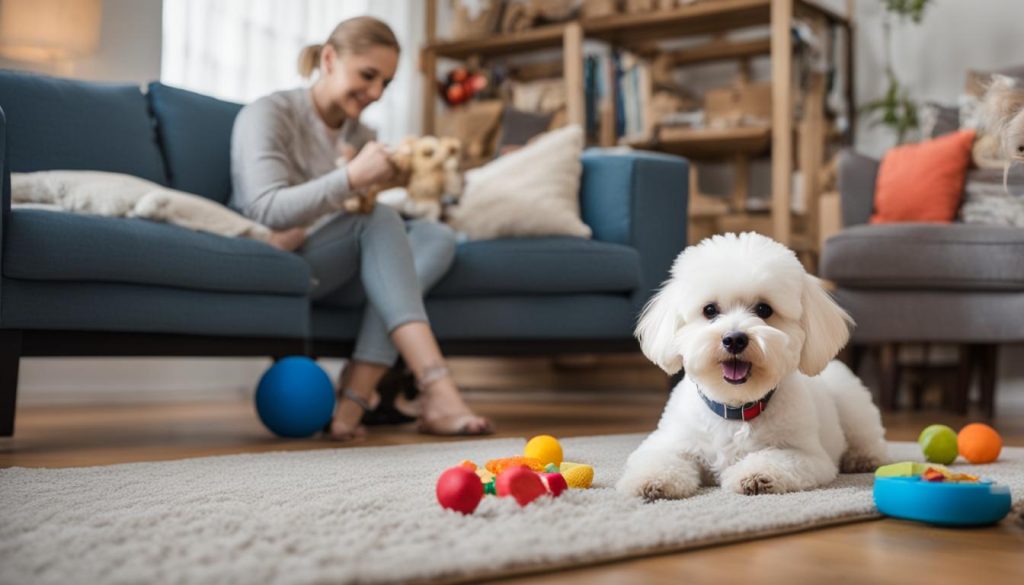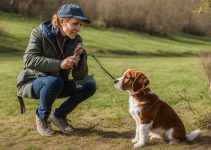Hi there! If you’re a proud owner of a Bichon Frise and looking for some helpful Bichon Frise training tips, you’ve come to the right place. Bichon Frise training is an essential part of ensuring their happiness and well-being. By establishing a consistent routine and using positive reinforcement techniques, you can turn your furry friend into a well-mannered and obedient companion. In this article, I’ll share some valuable Bichon Frise training tips and tricks specifically designed for Bichon Frises.
Start Bichon Frise Training Now
- Start house training immediately, using designated toilet spots and positive reinforcement.
- Crate training can be effective for Bichon Frises, as they are quick learners and will feel comfortable in a crate.
- Take your Bichon Frise out regularly to establish a bathroom schedule and prevent accidents.
- Address biting behavior by using positive reinforcement, redirecting, and avoiding rough play.
- Leash train your Bichon Frise gradually, reinforcing good leash manners and using a lightweight leather collar.
Crate Training for Bichon Frises
One common Bichon Frise training owners practice is crate training. Bichon Frises can be notoriously difficult to potty train, but crate training can help with the process. Introduce the crate as a positive space, using treats and comfortable bedding to encourage your Bichon Frise to enter willingly. Gradually increase the amount of time your dog spends in the crate, ensuring they are comfortable and don’t have accidents. It is important to not treat the crate as a “cage” or “prison,” but rather as a safe and cozy den for your Bichon Frise.
Crate training serves multiple purposes, including providing a safe space for your Bichon Frise when you cannot supervise them, as well as aiding in the potty training process. By associating the crate with positive experiences, your Bichon Frise will learn to view it as their own personal sanctuary.
When first introducing your Bichon Frise to the crate, place it in an area where the family spends time, such as the living room. Leave the door open and entice your dog with treats and praise to explore the crate. It may take some time for them to feel comfortable entering, so be patient and continue to reinforce positive associations.
Once your Bichon Frise willingly enters the crate, gradually start closing the door for short periods while you are present. Initially, keep the duration brief and gradually increase the time as your dog becomes more comfortable. Make sure to provide them with toys or chew treats to keep them occupied while confined.
Benefits of Crate Training
- Crate training helps prevent accidents in the house by teaching your Bichon Frise to hold their bladder and bowel movements.
- It provides a safe and secure space for your dog, especially during times when they may feel anxious or overwhelmed.
- Crate training can help with issues such as separation anxiety, as having a designated area can help your Bichon Frise feel more calm and secure.
- Using a crate can aid in the overall training process by establishing boundaries and teaching your dog self-control.
Remember, crate training, or any Bichon Frise training methods, should always be done in a positive and gentle manner. Never use the crate as a form of punishment, and always ensure your Bichon Frise has plenty of exercise and mental stimulation outside of the crate.
Housebreaking Your Bichon Frise
Taking your Bichon Frise out for bathroom breaks regularly is key to successful housebreaking. For puppies, this means going outside every 2 to 3 hours, or even more frequently. A good rule of thumb is to take your Bichon Frise outside 10 to 15 minutes after meals. This is when they are most likely to need to use the bathroom.
Positive reinforcement is essential during the housebreaking process. When your Bichon Frise does their business outside, be sure to praise them and offer treats as a reward. This reinforces the desired behavior and helps them understand that going outside is the right place to go.
Keeping a diary of your Bichon Frise’s bathroom schedule can be helpful in establishing a routine. This allows you to anticipate their needs and ensure you are taking them outside at the appropriate times. Consistency is key in housebreaking.
Until your Bichon Frise is fully house trained, it is important to continue crate training and supervision. The crate provides a safe space for your dog when you can’t directly supervise them, helping to prevent accidents in the house. With time and patience, your Bichon Frise will learn where they are supposed to go and become fully house trained.
Dealing with Biting Behavior
Biting can be a common problem with Bichon Frises, especially during play. It’s important to address biting behavior to ensure a safe and enjoyable environment for both you and your dog. Here are some tips:
The “Be a Tree” Approach
When your Bichon Frise bites, it’s vital to react appropriately. Use the “Be a Tree” approach by standing still and avoiding eye contact. This sends a clear message that biting is not acceptable behavior. Wait for your dog to release their grip before engaging in any further interaction.
Supervise Interactions with Young Children
Bichon Frises may bite due to excitement or fear, especially when interacting with young children. It’s crucial to supervise these interactions closely to prevent any biting incidents. Teach children how to interact gently with the dog, and encourage them to avoid rough play that may trigger biting behavior.
Positive Reinforcement and Redirection
When your Bichon Frise displays appropriate behavior and refrains from biting, provide positive reinforcement in the form of praise, treats, or toys. This helps to reinforce good behavior and teaches your dog that biting is not necessary to get attention or rewards. Additionally, redirect their chewing urges to appropriate toys and bones to prevent them from targeting inappropriate objects or people.
Remember that addressing biting behavior requires patience and consistency. It may take time for your Bichon Frise to learn, but with positive reinforcement and redirection, you can help correct the biting behavior. Avoid engaging in rough play or wrestling, as this may encourage biting and potentially lead to timid or aggressive behaviors.
By following these strategies, you can help your Bichon Frise overcome biting habits and promote a harmonious relationship between you and your furry friend.
Leash Training for Bichon Frises
Leash training is essential for all dogs, including Bichon Frises. It allows you to safely and control their movements during walks, ensuring their safety and the safety of others.
To start leash training your Bichon Frise, introduce them to the collar and leash. Allow them to sniff and get familiar with these new accessories. Use positive reinforcement, such as treats and praise, to create a positive association with the collar and leash.
Begin with short walks around the house or in a quiet area. Encourage your Bichon Frise to walk nicely on a loose leash, praising them for their good behavior. If they pull or become excited, calmly redirect their focus and continue walking. Avoid pulling or yanking on the leash, as this can cause discomfort or fear in your dog.
As your Bichon Frise becomes more comfortable with leash walking, gradually increase the length of your walks and introduce them to different environments. This will help them adapt to various surroundings and distractions they may encounter while on a walk.
Consistency is key when leash training your Bichon Frise. Practice walking on a regular basis and continue to reinforce good leash manners. Remember to be patient, as it may take time for your dog to master leash walking.
When choosing a collar for your Bichon Frise, opt for a lightweight leather collar. Leather is durable and gentle on their delicate fur. Make sure the collar fits snugly but not too tight, allowing for comfort and safety during walks.

With proper leash training, you can enjoy pleasant walks with your Bichon Frise while keeping them safe and under control. Remember to be patient, consistent, and positive throughout the Bichon Frise training process, and you’ll soon have a well-behaved and happy walking companion.
Socializing Your Bichon Frise
Proper socialization is essential for all dogs, including Bichon Frises. It helps them develop confidence and appropriate behavior in various environments, around different people, and with other animals. Socializing your Bichon Frise is a gradual process that requires patience and consistency.
When socializing your Bichon Frise, it’s important to avoid picking them up or responding loudly when approached by larger dogs. This can reinforce fearfulness and territorial behaviors. Instead, remain calm and use positive reinforcement to encourage appropriate interactions.
Exposing your Bichon Frise to different environments, such as parks or busy streets, allows them to become familiar with new sights, sounds, and smells. Slowly introduce them to new people, ensuring that these interactions are positive and rewarding.
When it comes to socializing with other animals, it’s important to monitor your Bichon Frise’s behavior and intervene if necessary. Use positive reinforcement when your Bichon Frise is around big dogs, rewarding them for calm and friendly behavior. Aggressive behaviors should never go unchecked, regardless of the size of the other dog.
Remember that socialization is an ongoing process, and it’s important to continue exposing your Bichon Frise to new experiences throughout their life. This will help them become well-rounded and confident dogs.
Teaching Basic Commands
When it comes to Bichon Frise training, it’s essential to start with basic commands to build a foundation of obedience. These commands will not only make your daily interactions easier but also stimulate your dog’s mental abilities. Here are some key commands to teach your Bichon Frise:
Sit
The “sit” command is one of the first commands you should introduce to your Bichon Frise. Begin by holding a treat above their head, and slowly move it back, prompting them to sit naturally. As soon as they are in a sitting position, say “sit” and reward them with the treat. Repeat this consistently until they understand the command.
Lie Down
The “lie down” command is similar to teaching the “sit” command. Start by holding a treat close to their nose and slowly lower it towards the ground while giving the command “lie down.” Once they are in a lying position, praise and reward them with the treat. Practice this command regularly to reinforce their understanding.
Stay
The “stay” command is vital for maintaining control over your Bichon Frise in various situations. Begin by having your dog sit or lie down. Then, with an open hand facing them, take a step back and say “stay.” If they remain in position, return to them and reward with praise and a treat. Gradually increase the distance and duration of the stay, always rewarding their success.
Come
The “come” command is crucial for your Bichon Frise’s safety and recall. Start in a small, distraction-free area and call your dog’s name followed by the command “come,” while encouraging them with an excited and positive tone. When they come to you, reward them with treats and praise. Practice this command regularly in different environments to reinforce their response.
Down
The “down” command is useful for getting your Bichon Frise to lie down on their belly. Begin with your dog in a sitting position. Hold a treat close to the floor and say “down.” Gradually move the treat forward, guiding them into a lying position. Once they are fully down, reward them with praise and a treat. Consistent practice will help them understand and respond to the command.
Bichon Frise Tricks
In addition to basic commands, teaching your Bichon Frise tricks can be a fun and stimulating way to bond with your furry friend. Here are a few trick ideas to get you started:
- Roll Over: Encourage your Bichon Frise to lie down and use a treat to guide them in rolling over onto their back.
- Spin: Use a treat to lead your Bichon Frise in a circle, gradually reducing the need for the treat as they learn to spin on command.
- Paw/Shake Hands: Prompt your Bichon Frise to sit and offer them your hand while saying “paw” or “shake hands.” Reward them when they lift their paw to touch your hand.
Remember, teaching tricks and Bichon Frise training requires patience, consistency, and positive reinforcement. Break down complicated tricks into smaller steps, rewarding your Bichon Frise for each milestone achieved. With practice and dedication, you and your Bichon Frise can enjoy mastering a range of impressive tricks!

Conclusion
Bichon Frise training requires consistency, patience, and positive reinforcement. By starting early and remaining consistent with commands and rewards, you can establish good behavior in your furry friend. Keeping training sessions short and engaging will help maintain your Bichon Frise’s attention and make the learning process enjoyable for both of you.
Socializing your Bichon Frise to different environments and other animals is crucial in preventing behavioral problems. Exposure to various situations will help them develop confidence and appropriate behavior. Remember, it’s important to set realistic expectations and avoid punishment-based training methods. Positive reinforcement and rewards will motivate your Bichon Frise to continue learning and make Bichon Frise training sessions more effective.
With dedication, patience, and the right Bichon Frise training techniques, you can transform your Bichon Frise into a well-behaved and happy companion. Remember to be consistent, provide positive reinforcement, and avoid punishment. Bichon Frise training takes time and effort, but the rewards are worth it. Enjoy the process and cherish the bond you’ll build with your furry friend through effective training.
FAQ
How can I crate train my Bichon Frise?
Introduce the crate as a positive space, using treats and comfortable bedding to encourage your Bichon Frise to enter willingly. Gradually increase the amount of time your dog spends in the crate, ensuring they are comfortable and don’t have accidents.
How often should I take my Bichon Frise outside for housebreaking?
It is recommended to take your Bichon Frise out every 2 to 3 hours, or more frequently for puppies. Take them outside 10 to 15 minutes after meals, as this is when they are most likely to need to use the bathroom.
How can I prevent biting behavior in my Bichon Frise?
Teach your Bichon Frise not to bite by using the “Be a Tree” approach when they bite, which involves standing still and avoiding eye contact. Supervise interactions with young children to prevent biting incidents. Use positive reinforcement, redirecting, and patience to correct biting behavior.
How can I leash train my Bichon Frise?
Begin by introducing your Bichon Frise to the collar and leash, allowing them to sniff and get familiar with it. Start with short walks around the house, praising your Bichon Frise for walking nicely on a loose leash and redirecting them if they pull. Gradually increase the length of walks and continue to reinforce good leash manners.
How can I socialize my Bichon Frise?
Expose your Bichon Frise to various environments, people, and other animals to help them develop confidence and appropriate behavior. Use calm and positive reinforcement when your Bichon Frise is around big dogs, and do not let aggressive behaviors go unchecked, regardless of their size.
What are some basic commands I can teach my Bichon Frise?
Start with foundational commands like “sit” and “lie down” when teaching your Bichon Frise. Use treats and praise to reward them when they perform the desired behavior. Keep training sessions short and engaging, aiming for 10-15 minute sessions a few times a day.






